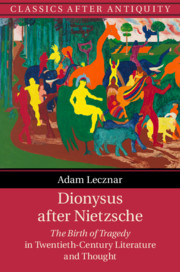Book contents
- Dionysus after Nietzsche
- Classics after Antiquity
- Dionysus after Nietzsche
- Copyright page
- Epigraph
- Contents
- Series Editors’ Preface
- Acknowledgements and Dedication
- Introduction
- Chapter 1 Corybants, Satyrs and Bulls
- Chapter 2 A Great Kick at Misery
- Chapter 3 In Search of an Absent God
- Chapter 4 What Oedipus Knew
- Chapter 5 Dionysus in Yorubaland
- Conclusion
- Bibliography
- Index
Chapter 5 - Dionysus in Yorubaland
Wole Soyinka
Published online by Cambridge University Press: 27 March 2020
- Dionysus after Nietzsche
- Classics after Antiquity
- Dionysus after Nietzsche
- Copyright page
- Epigraph
- Contents
- Series Editors’ Preface
- Acknowledgements and Dedication
- Introduction
- Chapter 1 Corybants, Satyrs and Bulls
- Chapter 2 A Great Kick at Misery
- Chapter 3 In Search of an Absent God
- Chapter 4 What Oedipus Knew
- Chapter 5 Dionysus in Yorubaland
- Conclusion
- Bibliography
- Index
Summary
This chapter explores the postcolonial resonances of Nietzsche’s Greeks by focusing on their appearance in the writings of the Nigerian political activist and Nobel Laureate Wole Soyinka. Soyinka encountered Nietzsche’s Birth of Tragedy as a student of G. Wilson Knight at Leeds in the 1950s; this experience was part of the syncretic vision of dramatic traditions that he developed and which he later theorised in his essay ‘The Fourth Stage’ (1969). In this essay Soyinka argues for a globalised understanding of tragedy that does not rely solely on an exclusivist narrative of its ancient Greek origins, such as can be found in Nietzsche’s invocations of Aryanism in The Birth of Tragedy, and which can incorporate his own Yoruba identity. Soyinka draws links between Dionysus and the Yoruba god Ogun, and he later weaves these into his adaptation of ancient Greek tragedy, The Bacchae of Euripides: A Communion Rite (1973). The postcolonial ambivalence that Soyinka writes into this adaptation is the subject of the final section of this chapter, as is his amalgamation of contemporary discourses of heroic black nationalism such as négritude in the character of the Slave Leader.
- Type
- Chapter
- Information
- Dionysus after Nietzsche<I>The Birth of Tragedy</I> in Twentieth-Century Literature and Thought, pp. 161 - 192Publisher: Cambridge University PressPrint publication year: 2020

